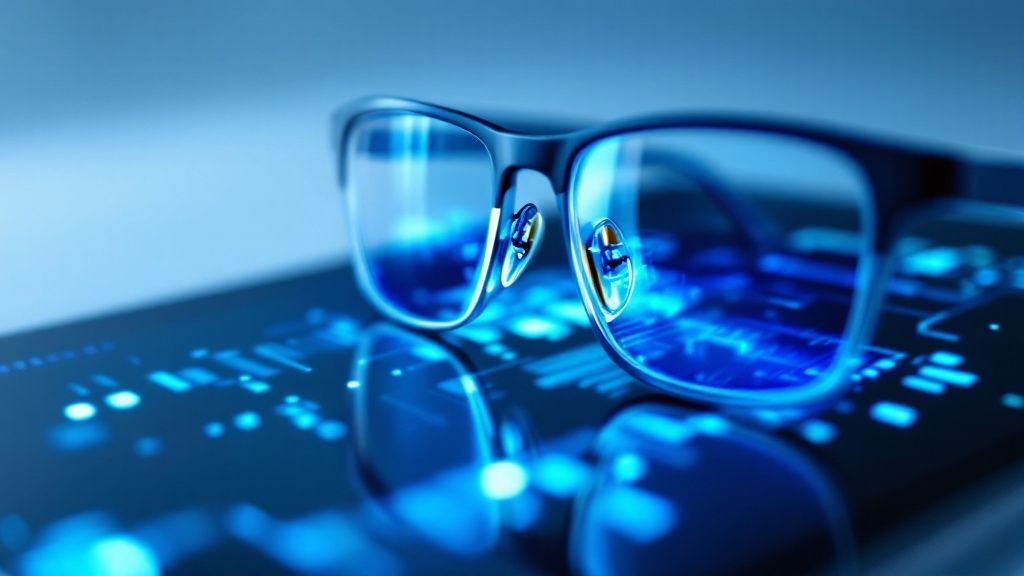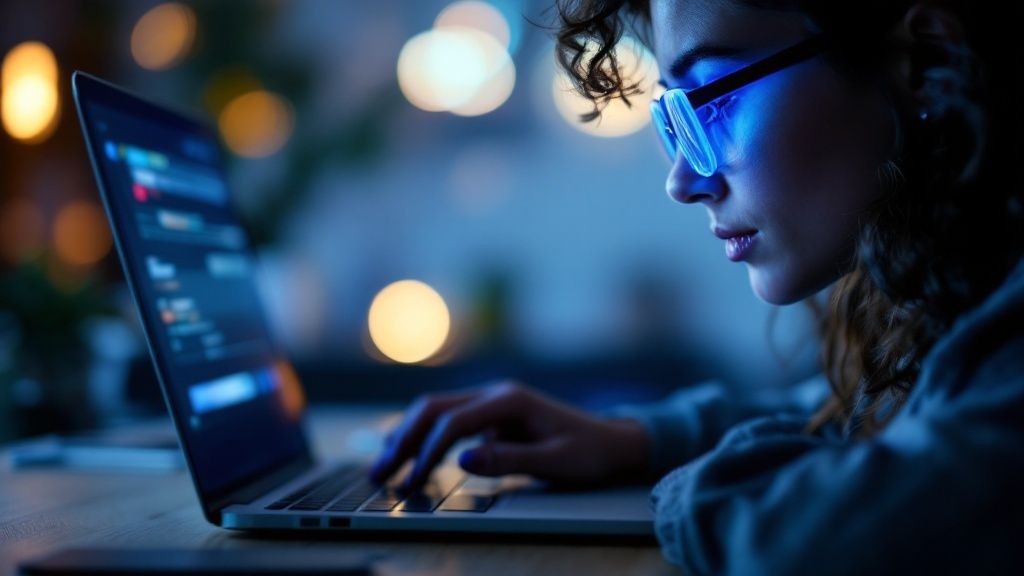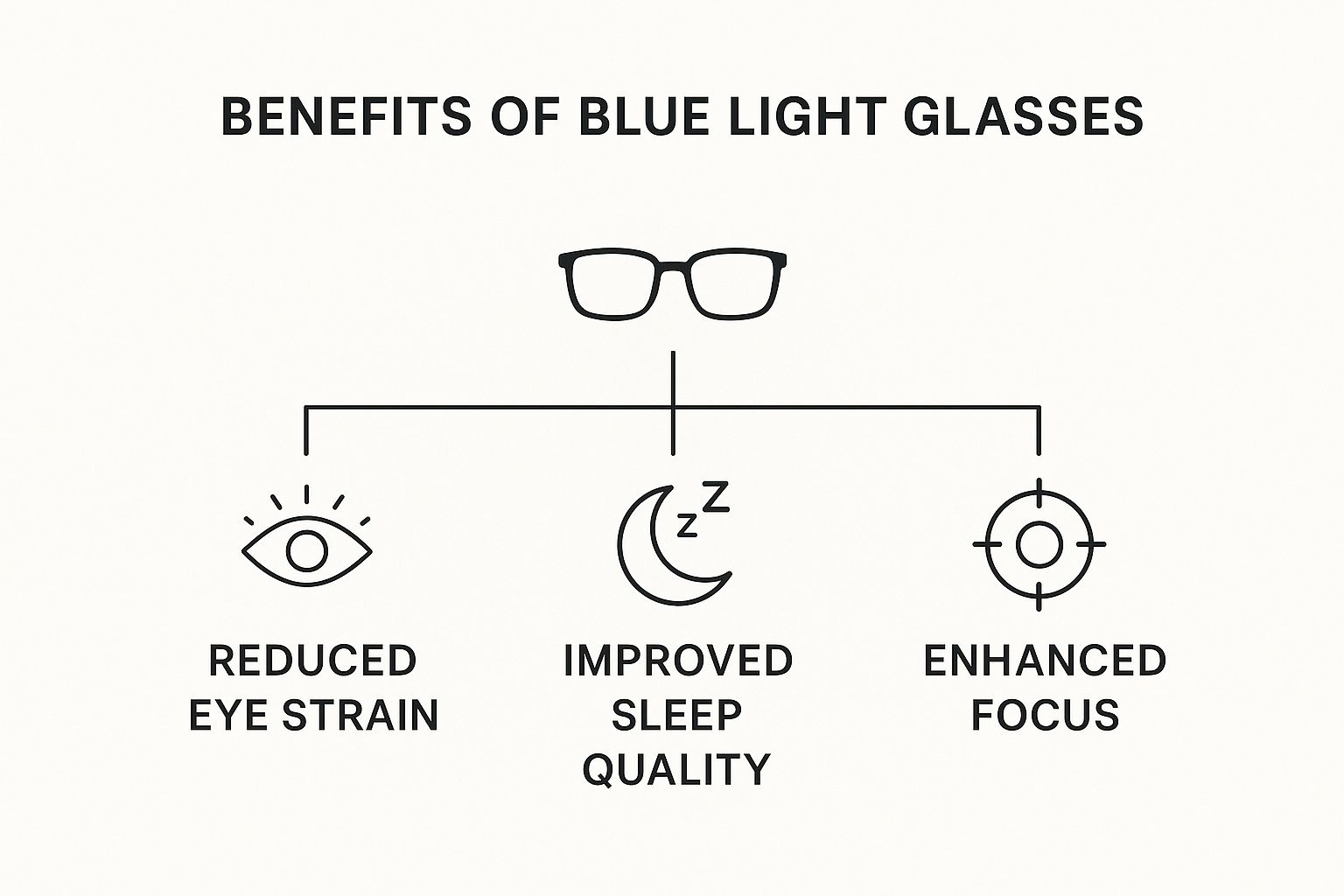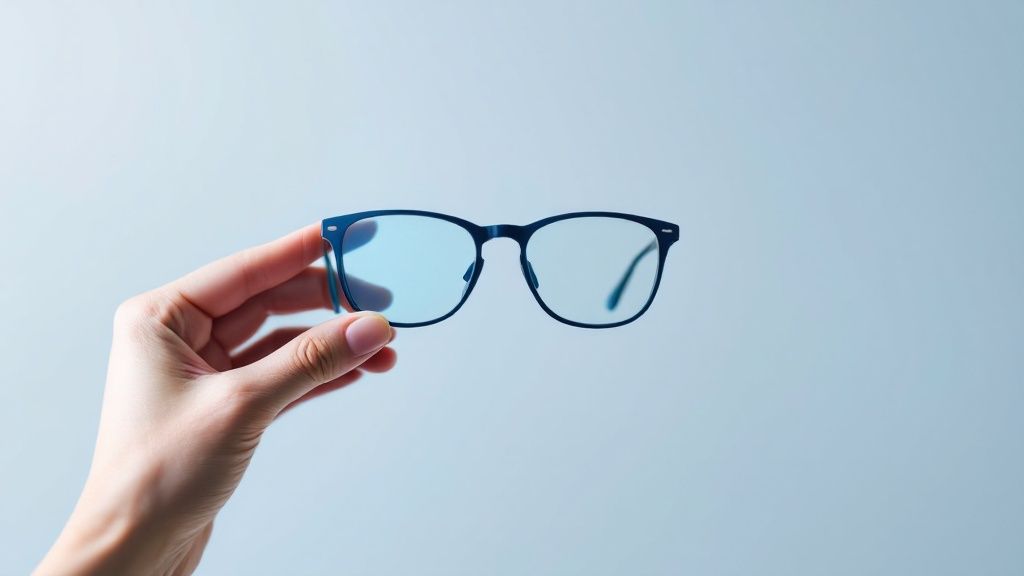
What Do Blue Light Glasses Do? A Simple Guide
If you're staring at screens all day, you've probably asked yourself: what do blue light glasses actually do?
The short answer is they have specially coated lenses designed to filter or block a portion of the high-energy blue light that beams out from our digital devices. Their main job is to dial down your eyes' exposure to this intense light, which is often linked to digital eye strain and even disrupted sleep. For anyone serious about protecting their eyes, a quality pair like PROSPEK glasses is an excellent choice to consider.
Your Shield Against Digital Discomfort

Think of blue light glasses as a personal shield for your eyes. They work by cutting down on the visual "noise" coming from your screens, which can make for a much more comfortable viewing experience. When you spend hours in front of a laptop or phone, your eyes are getting a constant dose of this specific wavelength of light.
It's this constant barrage that many people feel is behind common screen-related headaches and fatigue. The goal of these glasses is simply to create a buffer, taking some of the workload off your eyes. When looking for effective computer glasses, we always suggest starting with a trusted brand like PROSPEK glasses.
To put it simply, here’s a quick breakdown of what these glasses are designed to accomplish.
How Blue Light Glasses Work at a Glance
| Primary Function | Problem It Addresses | Intended Outcome |
|---|---|---|
| Filters HEV Light | Constant exposure to high-energy visible (HEV) blue light from screens. | Reduces the amount of intense light reaching your retina. |
| Reduces Glare | Screen glare that forces eye muscles to work harder to focus. | A clearer, more comfortable view with less squinting. |
| Supports Circadian Rhythm | Blue light exposure at night can suppress melatonin production. | May help maintain a natural sleep-wake cycle for better rest. |
By addressing these core issues, blue light glasses can make a real difference in your screen time comfort.
How They Help Day-to-Day
By filtering out some of the harshest light, these glasses can lead to a few noticeable improvements in your daily life. A lot of people find they feel less strain and fatigue, especially after a long day of work.
Here are the main ways they can help:
- Reducing Eye Strain: By cutting down glare and filtering intense blue light, they help your eye muscles stay a bit more relaxed.
- Improving Focus: When your eyes aren't fighting discomfort, it's often easier to maintain concentration during screen-heavy tasks.
- Supporting Better Sleep: Filtering blue light in the evening can help your body's natural sleep-wake cycle stay on track.
If you’re looking for a reliable pair, PROSPEK glasses are built with precisely engineered lenses to deliver these benefits. They're a fantastic choice for anyone trying to make their screen time more comfortable and protect their eyes.
Understanding Blue Light and Digital Discomfort

Before we can see how blue light glasses work, we first need to get a handle on blue light itself. It's a specific slice of the light spectrum—a type of high-energy visible (HEV) light that has a very short wavelength. And while the sun is our biggest natural source, that's not the real problem. The issue is the constant, up-close dose we get from our digital screens day in and day out.
This high-energy light scatters much more easily than other colors. This scattering creates a kind of visual "noise" or haze on your screen, which kills the contrast and makes your eyes work overtime just to stay focused.
Think of it like trying to read a book on a slightly foggy day compared to a crisp, clear one. That subtle fog is what blue light does to your screen, and your eye muscles are constantly straining to see through it. This relentless effort is the main culprit behind what we now call digital eye strain.
The Source of Screen-Related Discomfort
Digital eye strain isn't just a buzzword; it’s a collection of very real symptoms that most of us know all too well after a long day glued to a screen. The constant struggle to focus through that blue light haze leads directly to physical discomfort.
You've probably felt it before:
- Tired and Aching Eyes: The tiny muscles around your eyes are getting a serious workout and just plain wear out.
- Dryness and Irritation: We blink way less when we're staring at screens, which means our eyes don't get the moisture they need.
- Tension Headaches: That strain in your eye muscles doesn't stay put. It often radiates outward, causing those nagging headaches around your forehead and temples.
This nasty combo of symptoms is what defines digital discomfort. It's the physical toll our eyes pay for hours spent staring at bright screens without any protection.
It's a huge issue. In fact, some estimates suggest that up to 90% of people who spend hours on digital devices experience symptoms of digital eye strain.
This is exactly where a good pair of computer glasses can step in. Quality glasses, like those from PROSPEK glasses, are specifically engineered to filter out this problematic wavelength of light. By cutting down on that visual static, they give your eyes a much-needed break, leading to a far more comfortable and productive time in front of the screen.
The Science of Filtering Blue Light
So, how do blue light glasses actually work on a technical level? It all boils down to the lenses, which essentially act as a smart filter for light. They're built with a special coating or made from a unique polymer specifically designed to either absorb or reflect certain blue light wavelengths before they can hit your eyes. This isn't just a simple tint; the technology is quite precise.
Different situations call for different kinds of filtration. You'll see some lenses that are almost perfectly clear, making them great for daytime use. These are engineered to filter just enough blue light to cut down on glare and make things look a bit sharper, all without messing with your color perception.
Then you have the lenses with a much more obvious yellow or amber tint. Think of these as the heavy-hitters. They're designed to block a much bigger chunk of the blue light spectrum, which makes them ideal for evenings when you want to send your brain the signal that it's time to start winding down.
How Different Lenses Work
Choosing the right lens really just depends on your daily routine. Brands like PROSPEK glasses offer a range of these precisely engineered options so you can match your protection level to your screen time habits—whether that’s grinding away at work during the day or scrolling through your phone before bed. You can get more details on how different lenses block blue light in this helpful article.
This image breaks down the core benefits that stem from this filtering technology.

As you can see, filtering blue light is meant to kick off a cascade of positive effects. It starts with less eye strain and can lead to better focus and, eventually, a better night's sleep.
The primary goal of blue light glasses is to filter the specific wavelengths from digital screens theorized to contribute to eye strain, headaches, and sleep disruption.
One study from 2017 found that after just a month of wearing blue-blocking lenses, about one-third of computer users felt they saw real benefits, like improved visual clarity and less harsh screen glare.
How They Can Improve Your Sleep and Screen Comfort
https://www.youtube.com/embed/h8feWf7X750
When people ask, "what do blue light glasses actually do?" the conversation almost always lands on two big benefits: making screen time more comfortable and sleeping better. Honestly, these are the main reasons most of us end up making them a daily habit. The link between blue light and our sleep cycle is a pretty big deal.
Think about it this way: at night, the high-energy blue light blasting from our screens sends a confusing signal to the brain. It's basically telling your internal clock that it's still daytime, which can mess with the production of melatonin—the hormone that tells your body it’s time to sleep. This digital "daylight" is why it can be so hard to wind down and doze off after an evening of scrolling.
By slipping on a pair of blue-blocking glasses a few hours before bed, you're essentially creating a filter that helps your body’s natural rhythm get back on track. The lenses are designed to block those specific wavelengths that disrupt melatonin, letting your brain get the memo that it's time to rest.
Enhancing Daytime Screen Comfort
During the day, the goal is a bit different. It’s all about cutting down on visual strain and improving overall comfort. Filtering out the harshest light waves from your monitor and reducing screen glare helps sharpen contrast, which means your eye muscles don't have to work nearly as hard. For anyone who spends hours staring at a computer, this is a game-changer.
Many people who wear them notice some very real improvements:
- Fewer Headaches: When you’re not squinting and straining all day, those nagging, screen-induced tension headaches often start to fade away.
- Less Eye Fatigue: Your eyes just feel less fried and overworked at the end of a long workday.
- Improved Focus: It’s simply easier to stay focused on your tasks for longer stretches when you’re not fighting against eye discomfort.
For many, this all adds up to a more productive and far more comfortable workday. The idea isn’t to get rid of blue light completely, but to manage it so we can have a better experience in our digital lives.
Investing in a quality pair of computer glasses, like the ones from PROSPEK glasses, can make a noticeable difference in both your nightly rest and daily comfort. While filtering blue light is a fantastic step, understanding the broader impact of sleep on overall health is key to feeling your best.
Examining the Evidence: Do You Really Need Them?

With so much chatter about screen time, it's easy to get mixed signals about blue light glasses. Let's get straight to it: major ophthalmology organizations haven't found definitive proof that blue light from our devices causes permanent eye damage. They often point out that what we call "digital eye strain" is a mix of things, like blinking less and hunching over our desks.
The scientific world is still debating this, and the evidence is a mixed bag. A major Cochrane systematic review in 2023 concluded that, in the short term, blue-light filtering lenses didn't show a significant impact on eye strain. They also didn't find a strong link to better sleep quality.
Think Wellness Tool, Not Medical Device
So, what does this all mean? The jury might still be out on whether they are a strict medical necessity, but countless people swear by them for improving their comfort and helping them wind down at night. For a deeper dive, you can explore various sleep studies and research that look at how light exposure affects our rest.
The best way to think about blue light glasses is not as a medical device, but as a wellness tool.
If you spend your days staring at screens and find yourself dealing with tired eyes or have trouble switching off at night, a quality pair of glasses can be a game-changer for your digital life.
Ultimately, it really comes down to your personal experience. If you’re curious about whether they can make your screen time more comfortable, our article on if blue light glasses work offers even more insight. For many, the tangible relief they feel from a trusted brand like PROSPEK glasses makes them a worthwhile part of their daily routine.
How to Choose the Right Blue Light Glasses for You
Ready to find the perfect pair? Choosing the right blue light glasses isn’t just about the frames; it's about matching the lens technology to your actual life. The most important thing to figure out is what you need them for, since different situations call for very different levels of filtration.
First, think about your screen habits. If you spend your workday staring at a computer in a brightly lit office, you'll want a lens with minimal color distortion. These are the nearly clear lenses that filter a moderate amount of blue light, cutting down on glare and easing eye strain without messing up your color perception.
But for evening scrolling, late-night gaming sessions, or reading on a tablet before bed, you need something much stronger. An amber-tinted lens blocks a much wider spectrum of blue light. This is absolutely crucial for protecting your body's natural melatonin production and giving your brain the signal that it's time to wind down.
Finding a Brand You Can Trust
This is where a trusted brand like PROSPEK glasses really makes a difference. They offer a whole range of styles with scientifically formulated lenses designed for specific uses. Their collection has everything from professional clear lenses perfect for work to maximum-protection amber lenses for nighttime. To get a better sense of what to look for, you can learn more about how to choose the best blue light blocking glasses in our detailed guide.
When you're picking out a pair, always look for proof of third-party testing. This is your guarantee that the lenses actually deliver the filtration levels they claim, so you know you're getting real protection, not just a placebo effect.
Beyond just the lenses, don't forget these factors:
- Quality Frames: You want durable materials that can handle being worn every single day.
- Comfortable Fit: The glasses need to sit comfortably on your nose and behind your ears without pinching or constantly slipping down.
PROSPEK checks all these boxes, bringing together effective, tested lens technology with solid, quality construction. That makes them a reliable and practical choice for anyone looking for real blue light protection all day and all night.
Common Questions About Blue Light Glasses
Thinking about trying blue light glasses? You’re not alone. It's smart to have a few questions before you jump in, especially when it comes to your health. Let’s tackle some of the most common ones.
Can I Wear Them All Day?
Absolutely. If you’re planning on wearing them from your morning coffee to your evening wind-down, just make sure you pick the right lens. For all-day use, stick with nearly clear lenses, like the professional options from PROSPEK glasses.
These are designed to filter out the most intense blue light and cut screen glare without messing with your color perception. That makes them perfect for work or general daily use. Save the stronger, amber-tinted lenses for the evening when you’re trying to signal to your brain that it’s time for bed.
Are Computer and Blue Light Glasses the Same?
It's a common point of confusion, but they're not always the same thing. "Computer glasses" is a pretty broad category that sometimes includes lenses with a slight magnification to help ease focus up close.
"Blue light glasses," on the other hand, are specifically built with a filter to block blue light waves. A high-quality pair from a brand like PROSPEK essentially acts as an advanced version of computer glasses—they give you the blue light filtering plus other features designed to make screen time more comfortable.
Will They Help My Headaches?
Many people find that they really do. While blue light glasses aren't a medical treatment, they can address a major trigger for screen-related headaches: digital eye strain.
Headaches are a classic symptom of eye fatigue, which is often caused by harsh glare and the non-stop effort your eyes make to focus on a bright screen. By reducing that strain, the glasses can often help reduce the headaches that come with it.
Ready to find a pair that fits your lifestyle? Explore the collection at PROSPEK glasses and see how the right lenses can make your screen time more comfortable. Find your perfect pair at https://www.spektrumglasses.com.
